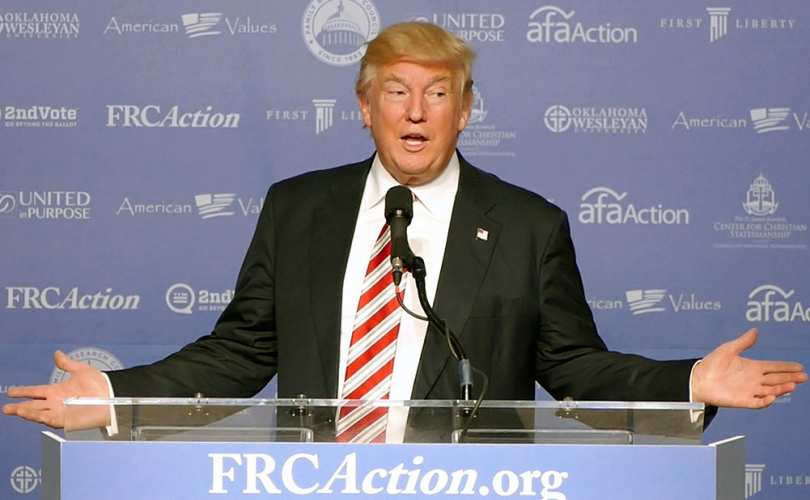What Trump means for us
Note: This is the main editorial by Paul Tuns in the January 2017 edition of The Interim newspaper, Canada's national pro-life newspaper, and is re-published with permission of the Interim.

Trump at September 2016 Value Voters Summit
January 11, 2017 (theinterim.com) - On Jan. 20, over the chants of protesters and the lamentations of elites, Donald Trump will become the 45th president of the United States. His unlikely path to victory overturned so much so-called “conventional wisdom” that, if pollsters and pundits depended on accuracy for their livelihoods, they would, like so many recently unseated incumbents, now be looking for work.
As it is, these experts will go on being well paid and wrong, and will likely spend President Trump’s first term explaining how he regularly accomplishes things they claim to be impossible. The American mainstream media is about to embark on four very incredulous years.
Trump’s unconventional ascent is the most surprising and significant political event in a generation and, for Canadian pro-lifers, it could portend good things.
Trump is, of course, crass, erratic, thin-skinned, and approval-hungry; and the recent vintage of his pro-life positions has been, for many veteran defenders of the unborn, reason enough to doubt the depth of his convictions. Such doubts, however, are dissipating quickly.
Since his election, Trump has made many extremely encouraging appointments, and his cabinet already boasts more committed pro-lifers than George W. Bush’s. While we await, with bated breath, his most important announcement – that of his first nominee to the Supreme Court – we do so with growing confidence.
Trump's missteps on life issues during the campaign (such as his musings about legal penalties for women who procure abortions) appear, in retrospect, to be the errors of a sincere novice. Likewise, his repeated opposition to the 1973 U.S. Supreme Court Roe v. Wade decision does seem to be the expression of a firm and abiding intention.
According to Trump’s spluttering detractors in the press, his election sounds the death-knell for America’s proudest traditions. However, the overwrought epitaphs for the Republic, the indecent convulsions of grief on American campuses, and the recent vigorous campaigns against “fake news” are all indications not of impending oppression but of a collective illusion, one which is becoming all the more desperate as reality rudely intrudes.
The populist demon currently being denounced by the mainstream media is really the spawn of their own imaginations, a paranoid, self-inflicted fever-dream.
A less extreme version of this nightmare haunts social liberals during every election cycle, as evidence of “hidden agendas” is discovered in the very qualifications, retractions, and apologies that extract from social conservatives. Thus do our would-be champions contribute to their own de-normalization: their apologies prove to the public they have something to hide, their concessions win no new political friends, and their dispiriting betrayals make enemies of us, their would-be base of support.
The intensity of fear and loathing that Trump evokes is, therefore, a means of compensating for his lack of cooperation with this familiar tactic. From the outset of his campaign, Trump declined to facilitate his own failure by accepting the rules set by political antagonists, both within and outside of his own party.
Prognosticators, of course, held that each of his violations of these unwritten rules would ensure his defeat and, like climate alarmists, their threatening predictions became more dire as each disaster they anticipated never appeared. For several long and intrepid months, Trump led his party across several putative third rails suffering only minor shocks himself while inducing paralysis in those who opposed him.
Trump’s bonfire of broken rules makes visible the outline of a new political reality—one which pro-life Canadians should greet with great relief.
Social liberals like Justin Trudeau, for instance, now have new reason to fear because their fear-mongering is no longer an infallible path to political victory. Indeed, Trump’s victory reveals that such bullying and shaming is dependent on the complicity of their conservative victims (and is, in fact, commensurate with their cowardice).
Should a bold Canadian social conservative show any of Trump’s spleen, politicians like Trudeau would quickly be forced to make arguments for radical agendas, which are so notoriously unpopular, that they are usually left to our radical courts to advance.
Cowardly conservatives, therefore, are the real victim of this new order and they, above all, should be perturbed by Trump, for their timorousness was only defensible without the example of conviction and success in combination – a combination demonstrated quite clearly by Trump’s stunning victory.

Patrick Brown (centre) in Gay Pride parade
For an example of this kind of cowardice, one could not do better than Patrick Brown, the leader of Ontario’s Progressive Conservative party, whose ineptitude would almost be charming were it not paired with a lack of loyalty which would embarrass even Judas Iscariot. Politicians, of course, are not known for their resoluteness – and Brown reminds us why such unflattering stereotypes persist – but his recent betrayal of pro-lifers was so joyless, so obvious, and so ham-fisted that his artless play for the vanishing small slice of the electorate that still trusts him makes Esau’s bartered birthright look like an example from The Art of the Deal.
Indeed, Ontario’s next provincial election could prove that Kathleen Wynne made Brown dig his own political grave – and got him to pay for it, too.
Thus may Trump enjoy future victories with the same positions from which Brown retreated with such indecent haste; and Brown, meanwhile, could well suffer electoral defeat while piously adhering to the very playbook that Trump burned with disdainful aplomb. On that day, Brown will wear, as he always does, the pained and vacant look of a pupil struggling over a difficult question.
It will fall to other leaders to take, from Brown’s total failure, the obvious lesson that it teaches: namely, that socially conservative positions are not a political liability for true leaders. We trust that Canada will soon have such leaders: leaders who do not, like Brown, calibrate their beliefs by holding their fingers in the wind; leaders who defend the unborn without apology, compromise, or compunction; leaders who will, in due time, make Canada great again.
